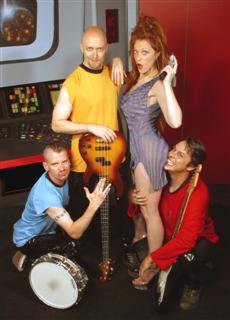
master_q
-
Content Count
4,797 -
Joined
-
Last visited
Posts posted by master_q
-
-
My expertise at video games doesn't extend past Atari 2600..........

Mine goes to the original Nintendo system. lol
But I have tried some of the other systems.
But I will add this to this topic..The new Nintendo Wii sounds interesting from the perspective that it is unique: Not just the same old graphics improvement that apparently the other new systems have.
-
Contract:
All that matters is the contractual agreements. There is nothing wrong with a homeowners association. I belong to one. They take care of the private park, the private roads, and keep order in what my neighbors can and cannot do with their property outside (e.g., no trash in front yard). It is voluntary. They also provide for some security.
Anarchism:
As far as this topic goes...it depends on how you define what "anarchism" is. There are different definitions of this term. And, in the context of political-ideological description, it seems to me that "anarchism" is defined very differently akin to how people define "liberalism," "conservatism" or "libertarianism".
After doing a Wikipedia search, here is some stuff that I found..............
According to Wikipedia, the most accepted definition in terms of a political-ideological description refers to communists (despite the fact that they reject the state). I will get to this anarchism that Wikipedia seemed to have embraced the most. (Some Forms: Anarcho-syndicalism, anarcho-communism, anarcho-collectivism, patformism, etc. As Wikipedia reports most anarchists reject private property. They believe in some form of collective, state like, agent.) There is also something called Anarcha-feminism! Devoted to crazy feminazi (to use a Rush Limbaugh term) anarchists. There is also anarcho-primitivism, green anarchism, and more.
Does anarchy mean chaos? For example....Take this statement: Iraq is in anarchy. Meaning "Iraq is in chaos"... More often then not, most define it this way.
Does anarchy mean no rules? For example...People can do whatever they please. There are no laws or rules. (Everyone can do anything.)
Does anarchy mean a form of communism?
For example...Noam Chomsky is fan of "anarchy" (anarcho-syndicalism). The symbol probably came from this form of anarchism. (Probably.) This form of anarchism would be where unions would democratically replace government function and private property would be abolished. Thus, it would not be "chaotic" in the sense of no rules. The profit-and-loss system would also be abolished under this definition of anarchism.
Wikipedia had similar forms of anarchy philosophies defined. (As I noted.)
Does anarchy mean the absence of coercion --- the "anarchy" of capitalism?
Here is also another form that Wikipeida notes of. For example...a voluntary society with law and order being "privatized". Think of a small anarcho community of Amish people. This is a close example of a private law society. Many "anarchists" would label it as "anarchy" in action. Noam Chomsky, in his view, calls this form of anarchism "tyrannical" because capitalist institutions, on a profit-and-loss system, would replace all government functions...he did not say that it is "chaotic" with no rules or laws. Just like the more anarcho communist ideas, there would be rules and laws.
As you can see it depends on how one defines anarchy. One can not be, necessarily, applied to the other. Example-----A supporter of anarcho-syndicalism, something Chomsky is a sympathizer with, would not call Iraq "in anarchy". By definition it would not be in "anarchy". (The question of would Chomsky or e.g. David Friedman anarchism "work," is another question outside of this topic. But these specific forms of anarchy do support institutions for law and order.)
-
I see we have a new chat room.
Come on down!

-
Star Trek Fans Chat!
Come on down to the StarTrekFans.net Chat Room!
Doors open at 6 PM ET
-
Tomorrow I will not be here. So it is probably best to schedule it "official" now.
I doubt we will have a good turnout---if you can call it a "turnout" (unfortunately)..but you never know. We will make the chat at 6 PM ET.
Try To Make It!
-
I guess I could manage bumping it up to 6.
But we need more input to set-down a firm time...!
-
Because I will be around this week. Why not schedule a last minute chat?
How about a chat after Thanksgiving Day? (Friday, the 24th.)
I am open to suggestions for time. But something around 4 PM ET would be best.
-
nothing as long as "we" is not a part of the alleged "solution" to the "problem"
http://www.startrekfans.net/index.php?show...amp;hl=master_q
-
Thanks for Coming!
Roy was there...so we had to get three (chat room) "moderators" to watch him: three-to-one. (You know how Roy is...)
-
Good Morning. Later this afternoon we will be having our chat!
Hope to see you there. Come on down!
(Personal Note: After this weekend I will be in "hiatus" from StarTrekFans.net due to some projects. ...Looking forward to the chat... :) )
-
Mini Q REPORT
The October Mess Hall Chat
Join us tomorrow (10/14) at 4pm et in the StarTrekFans.net chat room...^

Beyond Antares: Our very own SpaceTigger has an exclusive interview with Karl V. Miller, Captain of the Star Trek band Warp 11...^ (nota bene: some adult content)

StarTrekFans.net: See our 2004 interview with Warp 11 on TREK-NEWS-TALK...^
-
Good banner. :)
I don't know if StarTrekFans.net has anything like that planned this year......But even if STF does not, I hope VBG will put it up for Halloween week! :)
-
Congratulations! :)
-
Reminder: The October Mess Hall Chat will be tomorrow!

-
OK...I guess I will take the step to make it "official"
Our October Mess Hall Chat will be on Saturday, October 14 at 4:00 PM ET.
Unless there are any objections, Alterego, maybe we could sent out a mass email to see if we can get a few more people to attend?
-
From the available replies........I would say that Saturday, October 14 at 4PM EST looks good. But let's wait a little more before making this official.
Alterego, when we lock down a day & time, could you send out a mass email about the upcoming chat?
-
Warp 11

Warp 11's most recent album "Boldly Go Down On Me" just spawned a new music video for their latest single "She Make It So" -
YouTube:
This music video won "Best Music Video" at the "Sacramento Film &
Music Festival", and is now featured on YouTube, MySpace, and will soon be available at a higher quality on the Apple iTunes Music Store.
Sci-fi rock gods Warp 11 have built a large following over the past few years, largely based on live concerts packed with an unlikely mix of the regular nightclub crowd and hard core Trekkies. Fan favorites include songs such as "Seven of Mine", "Trekkie Girl", "Rage Against the Federation" and "Don't Klingon Me".
Momentum contines to grow - Warp 11 music is regularly heard on U.S. rock radio stations, including their hometown KWOD 106.5 FM. A hometown Warp 11 concert was featured in the Paramount Pictures documentary "Trekkies 2" (now available on DVD). During "Comedy Central Roast of William Shatner", Warp 11's song "Everything I Do, I Do With William Shatner" was played during a montage of Shatner career highlights.
Warp 11 music is now available on amazon.com, at independent music stores, and on most major digital music services, including the Apple iTunes Music Store, MTV URGE, Real Rhapsody, Sony Connect, Yahoo! Music, Virgin Digital and others.
The official Warp 11 website is at: http://warp11.com
TREK-NEWS-TALK Interview: http://www.startrekfans.net/index.php?show...8&mode=threaded
-
October Mess Hall Chat

I have been speaking to a few people in PM about having a scheduled chat here at StarTrekFans.net.
Please reply and tell us what days (preferably weekends) / times are feasible for you to be apart of the live chat.

-
-
-
Yes, very cool stuff. <_< These are the people to look to...Not some incompetent government bums.
-
I have some free time.... I am in the chat room. Join me. <_<
(I will be there until the top of the hour.)
-
WASHINGTON (AFP) - People who consume alcohol earn significantly more at their jobs than non-drinkers, according to a US study that highlighted "social capital" gained from drinking.The study published in the Journal of Labor Research Thursday concluded that drinkers earn 10 to 14 percent more than teetotalers, and that men who drink socially bring home an additional seven percent in pay.
"Social drinking builds social capital," said Edward Stringham, an economics professor at San Jose State University and co-author of the study with fellow researcher Bethany Peters.
"Social drinkers are out networking, building relationships, and adding contacts to their BlackBerries that result in bigger paychecks."
The authors acknowledged their study, funded by the Reason Foundation, a libertarian think tank, contradicted research released in 2000 by the Harvard School of Public Health.
"We created our hypothesis through casual observation and examination of scholarly accounts," the authors said.
"Drinkers typically tend to be more social than abstainers."
The researchers said their empirical survey backed up the theory, and said the most likely explanation is that drinkers have a wider range of social contacts that help provide better job and business opportunities.
"Drinkers may be able to socialize more with clients and co-workers, giving drinkers an advantage in important relationships," the researchers said.
"Drinking may also provide individuals with opportunities to learn people, business, and social skills."
They also said these conclusions provide arguments against policies aimed at curbing alcohol use on university campuses and public venues.
"Not only do anti-alcohol policies reduce drinkers' fun, but they may also decrease earnings," the study said.
"One of the unintended consequences of alcohol restrictions is that they push drinking into private settings. This occurred during the Alcohol Prohibition of 1920-1933 and is happening on college campuses today. By preventing people from drinking in public, anti-alcohol policies eliminate one of the most important aspects of drinking: increased social capital."
The researchers found some differences in the economic effects of drinking among men and women. They concluded that men who drink earn 10 percent more than abstainers and women drinkers earn 14 percent more than non-drinkers.
However, unlike men, who get a seven percent income boost from drinking in bars, women who frequent bars at least once per month do not show higher earnings than women drinkers who do not visit bars.
"Perhaps women increase social capital apart from drinking in bars," the researchers said in an effort to explain the gender gap.
http://news.yahoo.com/s/afp/20060914/hl_af...lehealthalcohol
Now I know why I never have any money <_<
-
And I just bought three bags of it! lol
(Not today, but just before the news came out.)

Slouch --- It's the safest way to sit?
in Off Topic Discussions
Posted
Slouch - it's the safest way to sit
David Rose
http://www.timesonline.co.uk/article/0,,2-2475021,00.html